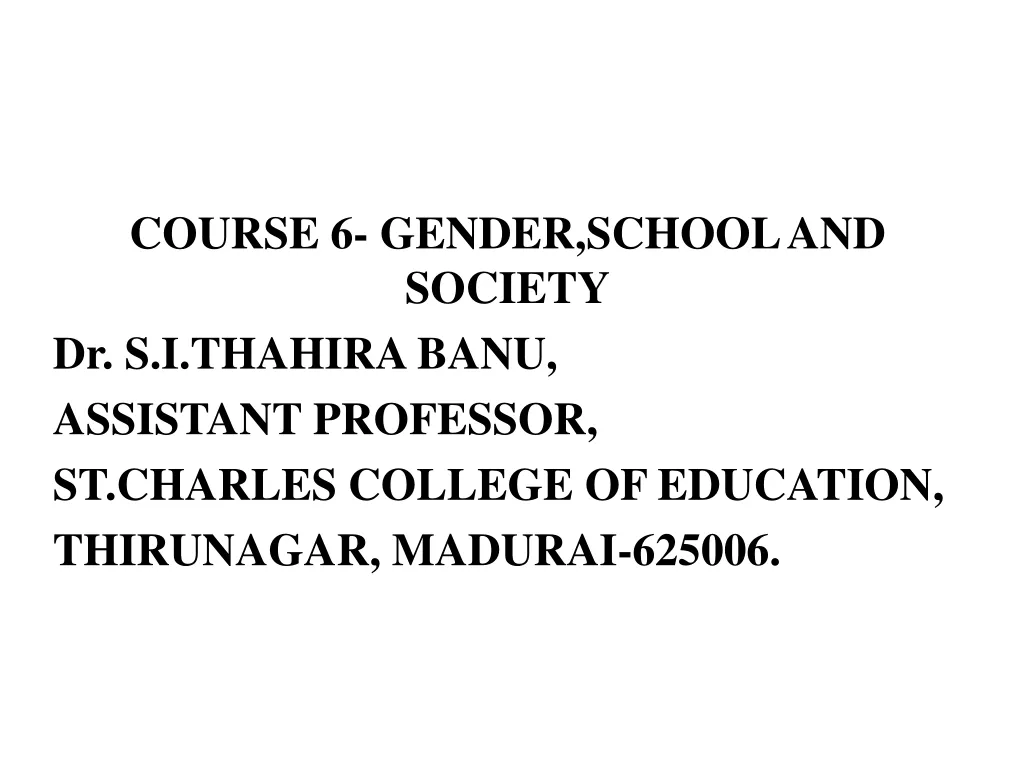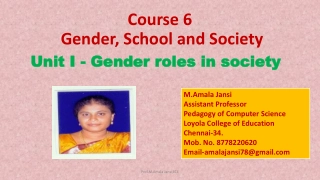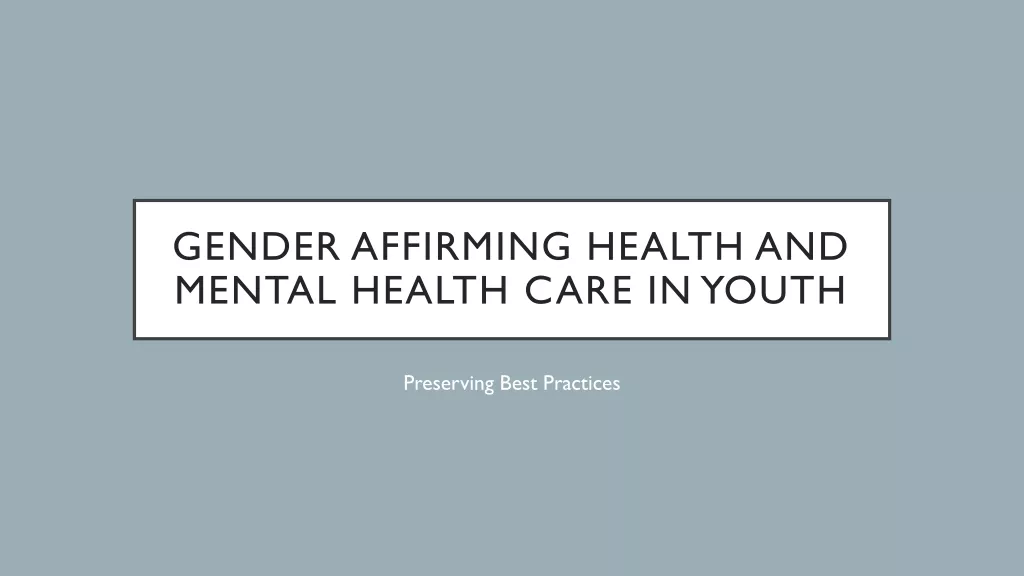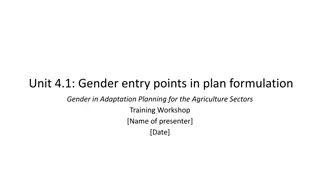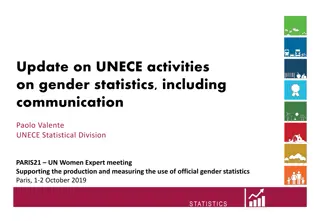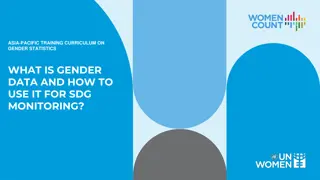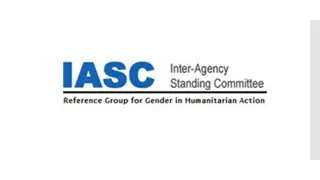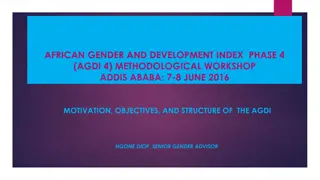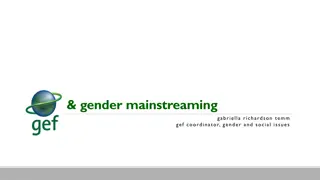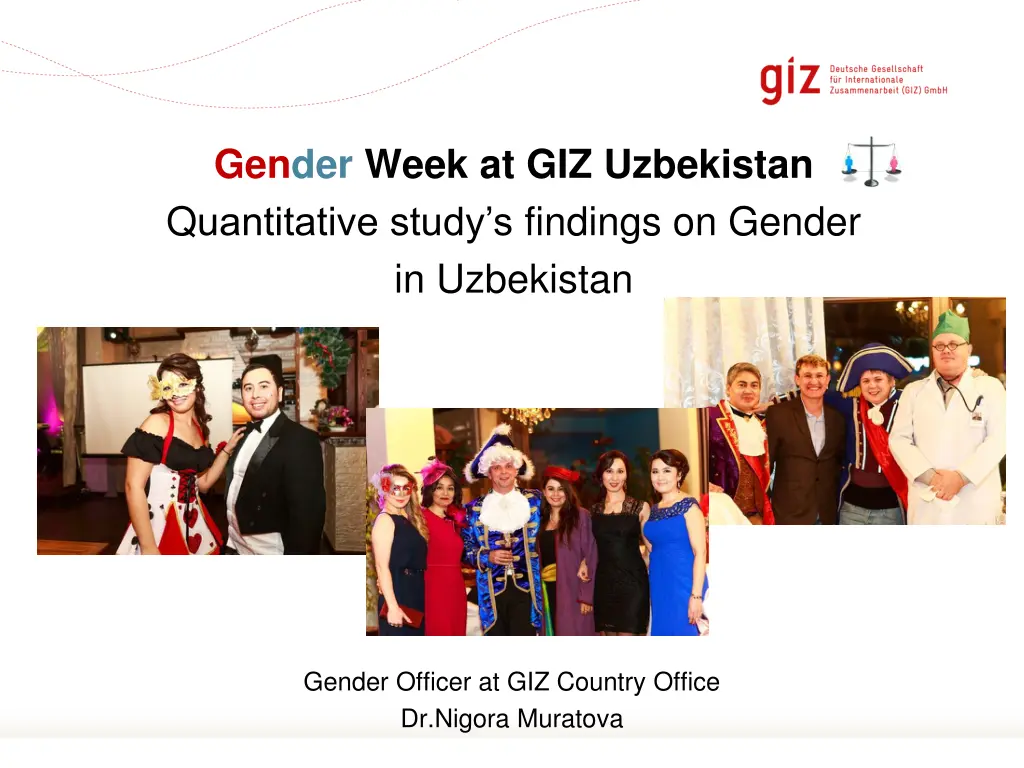
Gender Study Findings in Uzbekistan
Explore the quantitative study findings on gender in Uzbekistan conducted by GIZ, focusing on awareness levels, gender stereotypes, marital status, decision-making in families, and educational level-based opinions. The study aims to develop a Gender Strategy for GIZ in Uzbekistan and ongoing projects.
Download Presentation

Please find below an Image/Link to download the presentation.
The content on the website is provided AS IS for your information and personal use only. It may not be sold, licensed, or shared on other websites without obtaining consent from the author. If you encounter any issues during the download, it is possible that the publisher has removed the file from their server.
You are allowed to download the files provided on this website for personal or commercial use, subject to the condition that they are used lawfully. All files are the property of their respective owners.
The content on the website is provided AS IS for your information and personal use only. It may not be sold, licensed, or shared on other websites without obtaining consent from the author.
E N D
Presentation Transcript
Gender Week at GIZ Uzbekistan Quantitative study s findings on Gender in Uzbekistan Gender Officer at GIZ Country Office Dr.Nigora Muratova Seite 1
Objectives of Gender Study Examine the level of awareness among GIZ staff on basic gender concepts, understanding the importance and necessity of gender analysis in each sector / project / program Find out the impact of gender stereotypes and attitudes in a real family life as well as the need for professional training of individuals Identify and develop a Gender Strategy in the GIZ Country Office in Uzbekistan and ongoing projects / programs. 02.03.2015 Seite 2
Methodology of study on Gender Quantitative research using questionnaires Total number of respondents is 55: 51 out of 77 national personnel 4 out of 16 international personnel #male and #female staff Applied Statistical Package for the Social Sciences (SPSS) for data analyses 02.03.2015 Seite 3
Share of marital status not married married with partner 16% 20% 64% 02.03.2015 Seite 4
Who makes the final decision in the family? myself me&partner no answer 2.6% 9.1% 50.0% 71.8% 90.9% 50.0% 25.6% married not married with partner 02.03.2015 Seite 5
Stereotype opinions based on educational level and practices Female - only a mother and housewife, should not work Who will take sick leave when the children are ill? female male female male 100% 43.5% 35.5% 67% 64% 50% 50% 36% 33% 8.7% 6.5% 6.5% 0.0% 0% only mom only dad it depends Non-university degree (Yes) University degree (Yes) Non-university degree (No) University degree (No) 02.03.2015 Seite 6
Stereotype opinions based on educational level Only the man is responsible for the income in the household Boy needs to study, it is necessary to pay him a contract female male female male 75% 67% 83% 86% 67% 69% 50% 50% 53% 47% 33% 33% 25% 31% 14% 17% Non-university degree (Yes) University degree (Yes) Non-university degree (No) University degree (No) Non-university degree (Yes) University degree (Yes) Non-university degree (No) University degree (No) 02.03.2015 Seite 7
Stereotype opinions based on educational level and practices Does your spouse actively support you into a professional career? Stereotype: A woman should help first at husband career female male yes no 100% 69% 58% 82.6% 87.5% 50% 50% 42% 31% 17.4% 12.5% female 0% male Non-university degree (Yes) University degree (Yes) Non-university degree (No) University degree (No) 02.03.2015 Seite 8
How much time do you spend with your children per week? 16.7% 17.4% more than 36 h 21-28 h 14-21 h 7-14 h less than 6 h 17.4% 38.9% 21.7% 17.4% 27.8% 5.6% 26.1% 11.1% female male 02.03.2015 Seite 9
The proportion of women/men by bands/salary group/share in leadership positions 29.17% 43.75% 50.00% 56.00% 100.00% 70.83% 56.25% 50.00% 44.00% band 5 band 4 band 3 band 2 band 1 Male Female Seite 10
Understanding and applying of gender concepts by staff 6.1% 10.8% 20.0% Band 5 39.1% 25.8% Band 4 55.1% 14.0% Band 3 66.7% 39.1% Band 2 25.8% 4.3% Band 1 38.8% 4.3% 23.7% 13.3% 13.0% 0.0% 0.0% 0.0% 0.0% i understant the concept & use it in my project i understant but am in difficulty to use in my work i understand it poor, & can't use in my work i don't understand the concept totally 02.03.2015 Seite 11
In average, how many hours do you work per week? more than 60 50-59 40-49 30-39 less than 30 female male 02.03.2015 Seite 12
Representation of staff in programs and projects (Nov, 2014) EH/CIM/IF Fachkr fte 33% 67% Sustainable participatory pasture management in Farish district 60% 40% Grenz berschreitendes Wassermanagement ZAS 50% 50% Programm Gesundheit 60% 40% Programm Berufliche Bildung in Zentralasien 56% 44% F rderma nahmen des BMI zugunsten nationaler Minderheiten in Mittelasien 100% male F rderung der Rechtsstaatlichkeit in Zentralasien 67% 33% female F rderung des regionalen Handels in Zentralasien 33% 67% Fortbildung von rzten und medizinischem Personal 50% 50% Schwerpunktprogramm Nachhaltige Wirtschaftsf rderung: Komponente: 63% 37% GIZ B ro 50% 50% 0% 50% 100% 150% 02.03.2015 Seite 13
Have you attended trainings on Gender topics? Subjects: no yes Development of gender budgeting Gender disaggregated data 16.1% 21.7% Gender - sensitive indicators Gender equality Gender mainstreaming 83.9% 78.3% female male 02.03.2015 Seite 14
Conclusions Define focal points at projects/programs Provide workshops to update and raise awareness on Gender approaches Review of Projects/Programs publications, activities, etc. Organize rest room for special needs (pregnant women, breastfeeding mothers, drivers group etc.) Review a national personnel policy 02.03.2015 Seite 15
Some recommendations 02.03.2015 Seite 16
References Gender Community on Global Campus21: https://gc21.giz.de International Training Centre/International Labor Organization (ITC/ILO) - Gender eQuality Website: http://gender.itcilo.org/cms/index.php?option=com_frontpage&Itemid=1 The Inter-Agency Standing Committee (IASC) Gender Marker Assessment; Findings and Recommendations; June 2014 http://www.humanitarianresponse.info/system/files/documents/files/IAS C%20Gender%20Marker%20Assessment%20Report.pdf Gender in Local Government: A Sourcebook for Trainers, UNHABITAT 2008: http://www.un.org/womenwatch/directory/pdf/Source_BK_9- May.pdf 02.03.2015 Seite 17

